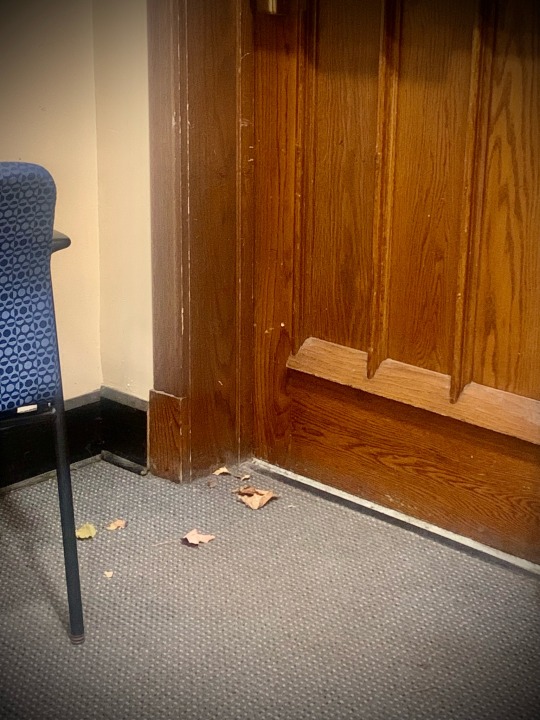Don't wanna be here? Send us removal request.
Text


Can Democracy Handle Climate Change?
Reflecting on an Evening of Dialogue at UChicago
It’s a brisk Wednesday evening in late November, and the weather in Chicago has finally dipped into the 30s. As I sit in the lecture room of Rosenwald Hall, I can hear the rustling of autumn leaves on the cobblestone walkways just outside the door. The neo-Gothic architecture of the University of Chicago’s campus stands solemnly in the cold night, casting long shadows that seem to mirror the weighty topics under discussion this evening.
The timing of this event feels fitting. With Thanksgiving break just a week away and the looming pressure of final exams only three weeks out, there’s a strange mix of stress and excitement in the air. But tonight, the focus shifts from the immediate pressures of academic life to two of the most profound challenges of our time: climate change and the resilience of democratic governance.

This evening’s event, moderated by Cristobal Bellolio, Tinker Visiting Professor at UChicago, explored the question: Can democracy handle climate change? The discussion featured three distinguished experts: Daniel Fiorino, Elizabeth Chatterjee, and Robert Gulotty, each bringing a unique perspective to the complex interplay between climate policy and governance.
The Challenges of Democratic Governance

Daniel Fiorino, Director of the Center for Environmental Policy at American University, kicked off the conversation by addressing a common question: Are authoritarian governments better equipped to tackle climate change? While it’s tempting to assume that the decisiveness of authoritarian regimes gives them an edge, Fiorino highlighted a critical finding: no evidence supports the idea that they outperform democracies in addressing climate change. Drawing on the Climate Change Performance Index, he underscored that no country—democracy or otherwise—is doing enough. The first three spots on the index remain blank, symbolizing the collective failure to meet the scale of the crisis.
Democracies, Fiorino acknowledged, may be slow, messy, and imperfect in their policymaking. But their accountability, transparency, and capacity for innovation are invaluable tools in crafting long-term solutions.
Democracy’s Flaws in Tackling Climate Change
Elizabeth Chatterjee, Assistant Professor of Environmental History at UChicago, presented a more critical perspective. From her lens as a historian of India’s energy systems, Chatterjee argued that democracy might be one of the worst systems for tackling climate change. India, with its flawed democratic structures, exemplifies both the challenges and potential of democratic governance. While the country has made significant strides in solar energy, becoming a global leader in solar parks, its system is far from a model for addressing climate change effectively.
Chatterjee also urged the audience to abandon the notion that American democracy represents an ideal. The U.S., along with Canada and Australia, stands out for its climate denialism, a phenomenon absent in much of the world. This critique landed heavily in the room, challenging assumptions about the superiority of Western democratic models.
Climate Change as a Global Problem
Robert Gulotty, Associate Professor of Political Science at UChicago, shifted the focus to the global dimensions of climate governance. Climate change, he reminded us, is a fundamentally international problem. Coal, consumed in massive quantities across the globe, drives much of the crisis, yet the costs of addressing climate change are unevenly distributed among nations. Agreements like the Kyoto Protocol illustrate the complexity of balancing national interests in a deeply interconnected world.
While most solutions to climate change have emerged at the national level, Gulotty emphasized the necessity of international cooperation. Without it, the uneven burdens of climate action threaten to deepen global inequities.
Reflections on the Evening
As the event drew to a close, I couldn’t help but reflect on the setting and the conversation. The rustling leaves outside Rosenwald Hall seemed almost symbolic—an audible reminder of the seasons turning and the passage of time, both of which are central to the climate crisis. The discussion inside, however, felt timeless, grappling with the enduring tension between urgency and deliberation, power and accountability, local action and global impact.
With Thanksgiving break just around the corner, I found myself thankful for spaces like this—where pressing global challenges are met with deep thought and dialogue. And yet, the weight of the discussion lingered. No system, democratic or authoritarian, has yet risen to meet the demands of this existential crisis.
Can Democracy Rise to the Challenge?

The question posed this evening—Can democracy handle climate change?—remains unanswered. But perhaps the better question is: How can we make democracy work better to address it? For all its flaws, democracy’s capacity to amplify diverse voices, foster innovation, and hold leaders accountable remains our best hope.
As I walked out into the cold night, with final exams waiting for me in the weeks ahead, I carried the conversation with me. Much like the neo-Gothic towers of UChicago, democracy’s strength lies not in its perfection but in its ability to endure, adapt, and aspire to something greater. In the face of climate change, it is up to us to ensure that it does.
0 notes